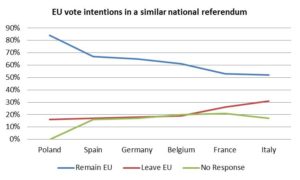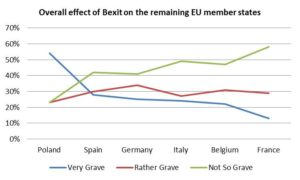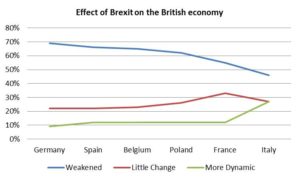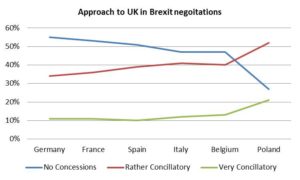The United Kingdom may have voted to leave the European Union but the Brexit vote has made citizens in other countries value the EU more, according to survey results released on Friday.
The survey of 1000 people in each of six European countries – Belgium, France, Germany, Italy, Poland and Spain – found a large majority would vote to remain.
The report (in French) is available through the Fondation Jean-Jaurès who, together with Fondation Européenne d’Etudes Progressistes (FEPS), commissioned the survey.
The findings reveal a broad reinforcement of the relationship of the citizens of the six countries with the EU. Four headline findings are shown graphically below.
 |
 |
 |
 |
The IFOP poll also shines a light on some of the finer detail of prevailing European opinion:-
- In none of the six countries surveyed was there a majority in favour of holding a similar EU In/Out referendum as run in the UK.
- None of the countries were in favour of leaving the Euro and returning to their national currency. This result does not include Poland which is outside the Euro zone.
- Only in Germany was there confidence in their own national politicians to relaunch the European project with a new vision. The other populations appear have more confidence in the politicians of other countries and in the European institution presidents.
- A clear majority in each country favoured the election of a European president by direct universal suffrage and the creation of a minister of finances and the economy for Europe. Opinion on the creation of a European army was more mixed.
- A large majority in each country, 77 per cent across all six, favoured an approach where the six founding EU members should facilitate a more rapid creation and adoption of initiatives leading to a Europe that is more integrated politically and economically.
- A majority in most counties was against further enlargement of the EU through the membership of Turkey, Ukraine or any of the Balkan states. Poland and Spain were more approving or conciliatory on this matter. Also, some privileged economic access was considered generally more acceptable.
- All together 75 per cent of the surveyed population of Europe felt it was rather a good thing to belong to the European Union.
In chief-exec.com’s opinion
The above findings are interesting, but must at best be considered highly provisional as the shock waves across Europe created by Brexit have hardly subsided. However, as an initial reaction it appears that belonging to the European Union has become distinctly more valued, even in the opinions of some far right political factions that traditionally have been more Europhobic.
There are some tendencies, however, that cross into UK opinion. Opinion is split unevenly between different social groups, with manual workers less convinced of the merits of EU membership, though parties of far-left persuasion have become appreciably more pro-EU. European retirees are much more favourable to the EU than their UK equivalents, though everywhere they are also more in favour of pursuing a hard-line in the Brexit negotiations than their younger counterparts. Such splits across social groups and ages need to be carefully managed on both sides of the negotiations.
It is worth noting that a hard-line Brexit approach taken by European politicians might well gain domestic approval and indeed may enhance cohesion within the remaining members.
The evolution of opinion is in a state of flux and opinion leaders should be aware that oratory designed for domestic consumption should be equally palatable in the homes of their European neighbours who remain their commercial and cultural partners.
